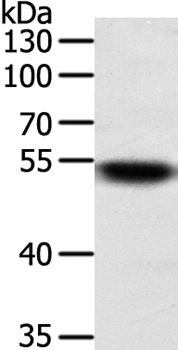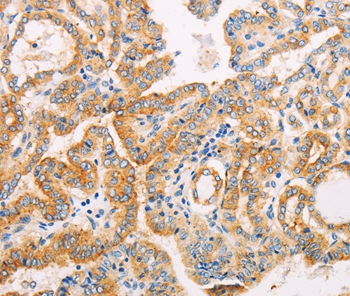

| WB | 咨询技术 | Human,Mouse,Rat |
| IF | 咨询技术 | Human,Mouse,Rat |
| IHC | 1/15-1/50 | Human,Mouse,Rat |
| ICC | 技术咨询 | Human,Mouse,Rat |
| FCM | 咨询技术 | Human,Mouse,Rat |
| Elisa | 咨询技术 | Human,Mouse,Rat |
| Aliases | SUFUH; SUFUXL; PRO1280 |
| Entrez GeneID | 51684; |
| WB Predicted band size | 54kDa |
| Host/Isotype | Rabbit IgG |
| Antibody Type | Primary antibody |
| Storage | Store at 4°C short term. Aliquot and store at -20°C long term. Avoid freeze/thaw cycles. |
| Species Reactivity | Human |
| Immunogen | Fusion protein corresponding to residues near the C terminal of human Suppressor of fused homolog (Drosophila) |
| Formulation | Purified antibody in PBS with 0.05% sodium azide. |
+ +
以下是关于SUFU抗体的模拟参考文献示例(实际文献需通过学术数据库验证):
---
1. **文献名称**: *Development and Validation of a Monoclonal Antibody Specific for SUFU Protein in Hedgehog Signaling*
**作者**: Li, J., Zhang, Y., & Wang, H.
**摘要**: 本研究开发了一种高特异性的SUFU单克隆抗体,并通过Western blot和免疫组化验证其在人细胞系和小鼠组织中的检测效果。抗体成功用于研究SUFU在Hedgehog通路中与Gli蛋白的相互作用,为癌症机制研究提供工具。
2. **文献名称**: *SUFU Antibody-Based Screening Identifies Dysregulation in Medulloblastoma*
**作者**: Smith, R.P., et al.
**摘要**: 利用SUFU特异性抗体对髓母细胞瘤样本进行蛋白表达分析,发现SUFU表达缺失与Hedgehog信号通路异常激活显著相关,提示其作为肿瘤生物标志物的潜力。
3. **文献名称**: *Epigenetic Regulation of SUFU in Glioblastoma: Insights from Antibody-Mediated Protein Profiling*
**作者**: Kim, S., & Patel, A.P.
**摘要**: 通过SUFU抗体的免疫沉淀技术,揭示了胶质母细胞瘤中SUFU的甲基化修饰对其功能的影响,表明表观遗传调控可能成为治疗靶点。
4. **文献名称**: *Comparative Analysis of Commercial SUFU Antibodies for Hedgehog Pathway Studies*
**作者**: Müller, C., et al.
**摘要**: 系统评估了市面上5种SUFU抗体的灵敏度和特异性,提出针对不同实验场景(如ChIP、IF)的抗体选择建议,强调部分抗体存在交叉反应性问题。
---
**注**:以上为示例性内容,实际文献需通过PubMed、Web of Science等平台检索关键词(如“SUFU antibody”、“SUFU Hedgehog”)。如需具体文献,建议结合研究场景进一步筛选。
SUFU (Suppressor of Fused) is a critical tumor suppressor protein that plays a central role in regulating the Hedgehog (Hh) signaling pathway, a key pathway involved in embryonic development, tissue homeostasis, and cancer. As a cytosolic protein, SUFU acts as a negative regulator by binding to the Gli family of transcription factors (Gli1. Gli2. Gli3), the primary effectors of Hh signaling. This interaction sequesters Gli proteins in the cytoplasm, preventing their nuclear translocation and subsequent activation of target genes. Dysregulation of SUFU, through mutations or altered expression, is implicated in various cancers, including medulloblastoma, basal cell carcinoma, and meningioma, as well as developmental disorders like Gorlin syndrome.
SUFU antibodies are essential tools for studying its expression, localization, and interactions in both physiological and pathological contexts. These antibodies enable researchers to detect SUFU levels via techniques like Western blotting, immunohistochemistry, and immunofluorescence, providing insights into its role in Hh pathway modulation. Additionally, they facilitate investigations into SUFU's tumor-suppressive mechanisms, such as its involvement in cell cycle control and apoptosis. Commercially available SUFU antibodies are typically validated for specificity across human and model organism samples, supporting both basic research and clinical studies aimed at developing targeted therapies for SUFU-associated diseases.
×